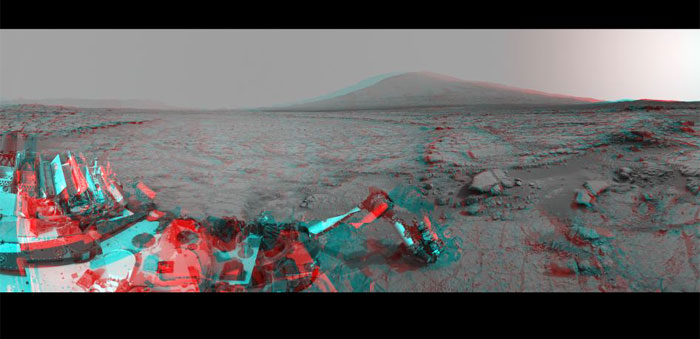.

Mars Stereo View from 'John Klein' to Mount Sharp -- Raw
Left and right eyes of the Navigation Camera (Navcam) in NASA's Curiosity Mars rover took the dozens of images combined into this stereo scene of the rover and its surroundings. The component images were taken during the 166th, 168th and 169th Martian days, or sols, of Curiosity's work on Mars (Jan. 23, 25 and 26, 2013). The scene appears three dimensional when viewed through red-blue glasses with the red lens on the left. It spans 360 degrees, with Mount Sharp on the southern horizon.
In the center foreground, the rover's arm holds the tool turret above a target called "Wernecke" on the "John Klein" patch of pale-veined mudstone. On Sol 169, Curiosity used its dust-removing brush and Mars Hand Lens Imager (MAHLI) on Wernecke. About two weeks later, Curiosity used its drill at a point about 1 foot (30 centimeters) to the right of Wernecke to collect the first drilled sample from the interior of a rock on Mars. This anaglyph was made with the images as captured by the Curiosity. Another version with the seams in the sky eliminated and cropped for optimal 3-D viewing can be seen at PIA16925.
.

Mars Stereo View from 'John Klein' to Mount Sharp
Left and right eyes of the Navigation Camera (Navcam) in NASA's Curiosity Mars rover took the dozens of images combined into this stereo scene of the rover and its surroundings. The component images were taken during the 166th, 168th and 169th Martian days, or sols, of Curiosity's work on Mars (Jan. 23, 25 and 26, 2013). The scene appears three dimensional when viewed through red-blue glasses with the red lens on the left. It spans 360 degrees, with Mount Sharp on the southern horizon.
In the center foreground, the rover's arm holds the tool turret above a target called "Wernecke" on the "John Klein" patch of pale-veined mudstone. On Sol 169, Curiosity used its dust-removing brush and Mars Hand Lens Imager (MAHLI) on Wernecke. About two weeks later, Curiosity used its drill at a point about 1 foot (30 centimeters) to the right of Wernecke to collect the first drilled sample from the interior of a rock on Mars. Seams have been eliminated from the sky portion of the mosaic to better simulate the vista a person standing on Mars would see. The mosaic has been cropped to reduce areas of extreme disparities between the views from the left and right eyes, which make viewing the 3-D anaglyph difficult. Another version of this anaglyph made from the images as captured by Curiosity is available at
5804 Views
